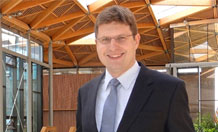
Dr Stefan Kraus, Science and Technology Facilities Council Fellow.
Exeter researcher recognised as rising star of research by Leverhulme Awards
University of Exeter astrophysicist Dr Stefan Kraus has been awarded the Philip Leverhulme Prize for his work on star and planet formation.
The £70,000 grant is awarded to researchers under the age of 36 who have already had a significant international impact and whose future research career is exceptionally promising.
Dr Kraus, a Science and Technology Facilities Council Fellow, said: “The prize will allow me to initiate new projects that will help answer some of the fundamental questions about the planet formation process. I am very excited that this work and my research field have been recognised with a Philip Leverhulme Prize.”
The discs around young stars are known as protoplanetary discs and are thought to be the sites of ongoing planet formation. However many fundamental questions about the physics of these discs still remain. For instance, it is believed that the strong stellar heating in the inner disc regions destroys dust grains, but further research is needed in order to determine how this affects the disc structure and the planet formation process.
Dr Kraus uses multiple separate telescopes that together provide very high image resolution. Known as interferometry, this technique enables him to study the processes in the inner regions of protoplanetary discs directly. The method allows the physical conditions of the inner parts of the discs to be determined and enables exploration of the impact of planet formation on the disc structure.
The prizes were established to commemorate the contribution of Philip Leverhulme, the Third Viscount Leverhulme and former trustee, to the work of the Leverhulme Trust. Twenty-nine prizes have been awarded across six disciplines: Astronomy and Astrophysics, Economics, Engineering, Geography, Modern Languages and Literature and Performing and Visual Arts.
Physics and Astronomy at the University of Exeter is recognised as one of the foremost centres of research in the country. Ranked 8th in the UK for world-leading and internationally excellent research, the department offers active programmes of research within astrophysics, biomedical physics, electromagnetic materials, and quantum systems and nanomaterials.
Date: 11 November 2013
